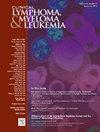将 BCMA 引导的 MRD 检测作为多发性骨髓瘤 BCMA CAR T 后复发的预测指标
IF 2.7
4区 医学
Q2 HEMATOLOGY
引用次数: 0
摘要
背景:最近批准的嵌合抗原受体T细胞(CAR T)和双特异性抗体疗法为复发难治性多发性骨髓瘤(RRMM)患者带来了新希望,临床试验观察到其疗效优于标准疗法。然而,BCMA导向疗法后复发的情况很常见,需要进一步研究:我们对57例接受BCMA定向CAR T治疗的RRMM患者进行了一项回顾性队列研究。只有在CAR T输注后第30天出现初始应答并失去BCMA表达的PC的患者才被纳入分析。在规定的时间间隔内对骨髓样本进行多色流式细胞术(MFC)检测BCMA + 浆细胞(PC)的再次出现,并采用国际骨髓瘤工作组的标准评估临床反应:结果:大多数患者在输液后的MFC检测中检测不到BCMA,55%的病例随后观察到BCMA+ PC再次出现。值得注意的是,在临床复发的患者中,有 91% 的患者出现了 BCMA+ PC 再次出现的情况,而且往往是在复发之前。早期复发早期BCMA+ PC再次出现可作为BCMA CAR T疗法后临床复发的预后标志。通过 MFC 监测 BCMA+ PC 水平为早期复发检测和知情治疗决策提供了可能。有必要开展进一步研究,包括新型BCMA导向的最小残留病(MRD)检测技术,以验证这些发现并完善RRMM管理策略。本文章由计算机程序翻译,如有差异,请以英文原文为准。
BCMA-Directed MRD Detection as a Predictor of Relapse after BCMA CAR T in Multiple Myeloma
Background
Recent approvals of chimeric antigen receptor T-cells (CAR T) and bispecific antibody therapies offer new hope for relapsed refractory multiple myeloma (RRMM) patients, with superior efficacy over standard regimens observed in clinical trials. However, relapse after BCMA-directed therapy is common and requires further investigation.
Patients and Methods
We conducted a retrospective cohort study on 57 RRMM patients treated with BCMA-directed CAR T. Only the patients who had an initial response and lost BCMA-expressing identified PC following CAR T infusion at Day 30 were included in the analysis. Multicolor flow cytometry (MFC) to detect BCMA + plasma cell (PC) re-emergence was performed on bone marrow samples at defined intervals and clinical responses were assessed using International Myeloma Working Group criteria.
Results
The majority of patients achieved undetectable BCMA on MFC postinfusion, with subsequent BCMA+ PC re-emergence observed in 55% of cases. Notably, 91% of patients experiencing clinical relapse showed BCMA+ PC re-emergence, often preceding relapse. Early relapse (<6 months) was associated with earlier BCMA re-emergence.
Conclusion
Early BCMA+ PC re-emergence may serve as a prognostic marker for clinical relapse post-BCMA CAR T therapy. Monitoring BCMA+ PC levels via MFC offers potential for early relapse detection and informed treatment decisions. Further studies, including novel BCMA-directed minimal residual disease (MRD) detection technologies, are warranted to validate these findings and refine RRMM management strategies.
求助全文
通过发布文献求助,成功后即可免费获取论文全文。
去求助
来源期刊

Clinical Lymphoma, Myeloma & Leukemia
ONCOLOGY-HEMATOLOGY
CiteScore
2.70
自引率
3.70%
发文量
1606
审稿时长
26 days
期刊介绍:
Clinical Lymphoma, Myeloma & Leukemia is a peer-reviewed monthly journal that publishes original articles describing various aspects of clinical and translational research of lymphoma, myeloma and leukemia. Clinical Lymphoma, Myeloma & Leukemia is devoted to articles on detection, diagnosis, prevention, and treatment of lymphoma, myeloma, leukemia and related disorders including macroglobulinemia, amyloidosis, and plasma-cell dyscrasias. The main emphasis is on recent scientific developments in all areas related to lymphoma, myeloma and leukemia. Specific areas of interest include clinical research and mechanistic approaches; drug sensitivity and resistance; gene and antisense therapy; pathology, markers, and prognostic indicators; chemoprevention strategies; multimodality therapy; and integration of various approaches.
 求助内容:
求助内容: 应助结果提醒方式:
应助结果提醒方式:


